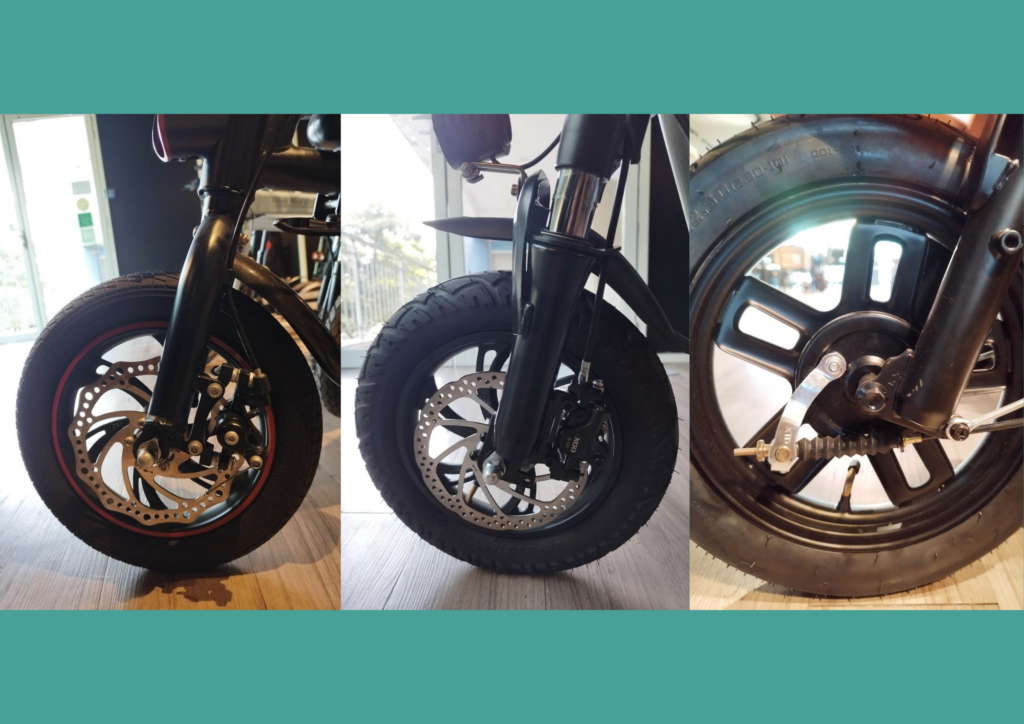
With the rapid advancement in electric two-wheelers, the choices of braking systems become increasingly significant. From mechanical to hydraulic to drum brakes, each brings its set of advantages and drawbacks. In this blog post, we delve into the pros and cons of these brake systems, offering insight into which technology might suit different riders.
Mechanical Brakes: Simplistic and Reliable
Mechanical brakes utilize cables to transmit the force from the brake lever to the wheel’s brake drum or rotor. They are revered for their simplicity and ease of maintenance. Due to their mechanical nature, they are less prone to fluid leaks and are generally more affordable to service. However, their braking performance may slightly lag behind their hydraulic counterparts, especially in high-demand scenarios. Additionally, mechanical brakes can be affected by cable stretch over time, necessitating regular adjustments.
Hydraulic Brakes: Precision and Powerful Stopping
In contrast, hydraulic brakes employ brake fluid to transmit force, offering unparalleled precision and powerful stopping capabilities. The absence of cable-sourced friction means a more immediate, consistent response, including in adverse weather conditions. However, the reliability of hydraulic systems is contingent on exacting maintenance due to the intricate network of hoses and seals. The cost of repairs and potential fluid leakage can also be a concern, particularly for electric two-wheelers used in diverse terrains.
Drum Brakes: Resilient, Yet Dated
Drum brakes, although a classic choice, are gradually being overshadowed by newer technologies. Despite their cost-effectiveness and resilience to water and mud, their inferior heat dissipation capability can result in diminished performance during prolonged or intensive braking. They are slightly heavier and more challenging to adjust compared to other options. Nevertheless, for electric two-wheelers intended for urban use, drum brakes might remain a viable and economical selection.
Conclusion: Navigating the Brake Terrain: Finding the Perfect Fit
As electric two-wheelers evolve, the importance of selecting the right braking system becomes paramount. While mechanical brakes excel in their simplicity and reliability, hydraulic brakes offer unparalleled stopping power, albeit with higher maintenance overhead. Drum brakes, though dated, propose steadfastness at a lower cost. Evaluating the specific needs and riding style is imperative in determining the ideal brake system. By assessing the pros and cons of each braking technology, riders can confidently navigate the terrain of choices.

I agree that brake systems play a crucial role in e-bikes, and it’s great to see a detailed comparison of different types.
Hi Tanya, we’re glad you found the comparison of different brake systems for e-bikes informative. Our team at Eko Life Malaysia prioritizes safety and takes pride in providing high-quality products and professional servicing. If you have any further questions or concerns, please feel free to reach out to us at [email protected] or +60 3-7890 3042. Thank you for your support and we look forward to helping you with all your e-bike needs.
Mechanical brakes seem like a viable option for casual riders like myself, but I’d love to experience hydraulic brakes on a more adventurous ride.
Hi Faisal, it’s great to hear that you’re considering upgrading to hydraulic brakes for a more adventurous ride! Yes, hydraulic brakes are highly reliable and offer superior stopping power, which is perfect for thrill-seekers. However, mechanical brakes are still a great option for casual riders, as they’re easy to maintain and less expensive. If you’re interested in experiencing hydraulic brakes, we’d be happy to help you find the right e-bike that suits your needs. Feel free to reach out to us at [email protected] or call us at +60 3-7890 3042. We’ll be happy to assist you!
Interesting read! I was surprised to see drum brakes included in the top 3 – I thought they were mostly used in motorcycles rather than e-bikes.
Hello Anna, thank you for sharing your thoughts on our blog post. You’re not wrong that drum brakes are more commonly associated with motorcycles, but they are indeed used in certain e-bikes, particularly folding e-bikes or those with limited space. Drum brakes offer a more cost-effective solution and can be more resilient in harsh weather conditions. We appreciate your feedback and encourage you to contact us at [email protected] or +60 3-7890 3042 if you have any more questions or would like to discuss further.